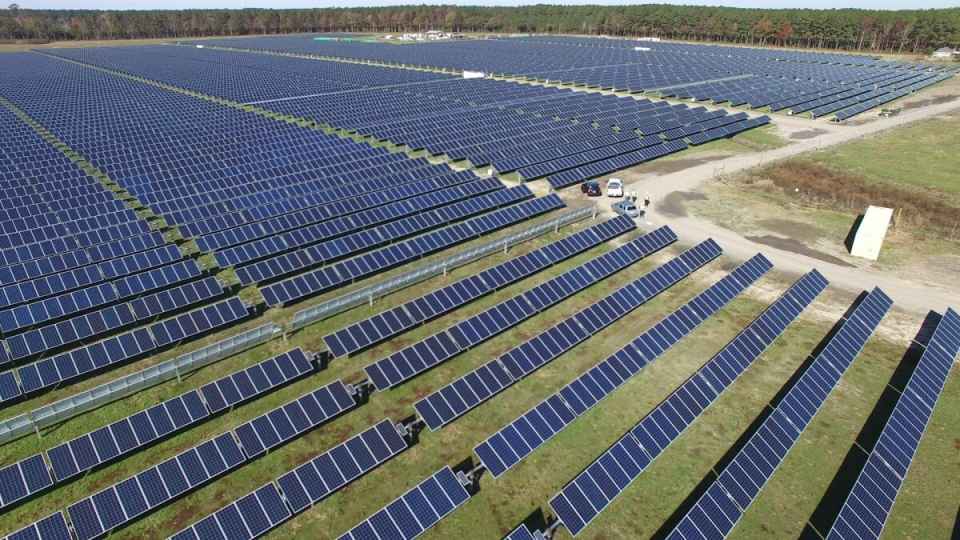Which is the first e-commerce company to set up solar farms in India?

Table of Contents
Which is the first e-commerce company to set up solar farms in India?
Amazon is the first e-commerce company to set up solar farms in India. This significant move was announced in September 2022 when Amazon unveiled plans to establish three solar farms in Rajasthan, collectively boasting an impressive capacity of 420 megawatts (MW). It marked a ground-breaking moment, with Amazon becoming the inaugural major e-commerce player to embark on such an endeavour within India’s borders.
About first e-commerce company to set up solar farms in India
| Aspect | Details |
|---|---|
| Company Name | Amazon |
| Solar Farm Locations | Rajasthan (Jodhpur, Bikaner, Jaisalmer) |
| Combined Solar Farm Capacity | 420 megawatts (MW) |
| Announcement Date | September 2022 |
| Power Purchase Agreements | Amp Energy India, ReNew Power, Brookfield Renewable Partners |
| Additional Solar Projects | 23 solar rooftop projects across 14 Indian cities, generating over 20 MW of clean energy |
| Target Completion Date | Expected to be fully operational by 2025 |
| Commitment to Renewable Energy | Aiming for 100% renewable energy usage across Amazon’s operations by 2025 |
| Contribution to India’s Goals | Supporting India’s goal to achieve 500 GW of renewable energy capacity by 2030 |
| Social and Economic Impact | Expected to create jobs and stimulate the local economy |
| Benefits for E-commerce Companies | Reduced energy costs, improved environmental performance, enhanced brand image |
The trio of solar farms will find their homes in the districts of Jodhpur, Bikaner, and Jaisalmer, each contributing to the nation’s sustainable energy future. Anticipated to be operational by 2025, these solar farms are projected to generate sufficient electricity to power over 300,000 households.
To bring this vision to life, Amazon inked power purchase agreements with prominent energy entities like Amp Energy India, ReNew Power, and Brookfield Renewable Partners, who will oversee the development and operation of these renewable energy hubs.
Complementing the solar farms, Amazon is also spearheading 23 new solar rooftop projects spanning across 14 cities in India. Collectively, these initiatives are set to generate an impressive 20 MW of clean, green energy.
Amazon’s commitment to solar energy is a tangible step towards fulfilling its pledge to achieve 100% renewable energy utilization across its operations by 2025. The company’s endeavors extend beyond solar energy, encompassing strategies to reduce packaging waste and electrify its delivery fleet.
This strategic investment by Amazon holds significant promise for India’s renewable energy sector. As the nation strives to attain 500 GW of renewable energy capacity by 2030, Amazon’s contributions will undoubtedly play a pivotal role in realizing this ambitious goal. Moreover, it’s expected to invigorate job creation and stimulate the local economy, fostering a ripple effect of positive change.
- Chandrayaan 3 Team Members Name List in Hindi
- Plumbing Materials Name List: Unveiling the A to Z of Plumbing
Benefits of solar energy for e-commerce companies like Amazon:
- Reduced Energy Costs: Solar energy presents a cost-effective, sustainable energy source, which is particularly advantageous for e-commerce giants with extensive data centers and vast warehousing operations.
- Enhanced Environmental Footprint: Harnessing solar power allows e-commerce firms to mitigate their carbon emissions and bolster their environmental credentials, an appealing prospect for conscious consumers and investors alike.
- Strengthened Brand Image: A commitment to solar energy fosters a more sustainable and environmentally responsible brand image. This can translate into heightened customer loyalty and increased brand visibility.
Conclusion
In conclusion, Amazon’s foray into solar energy not only marks a momentous milestone for India’s renewable energy landscape but also sets a positive precedent for e-commerce companies worldwide. It’s a mutually beneficial endeavour, fostering a greener future for both the corporation and the environment.
Renewable energy is energy derived from sources that are naturally replenished, such as sunlight, wind, and hydropower, and can be used without depleting them.
Renewable energy is crucial because it reduces greenhouse gas emissions, decreases reliance on fossil fuels, and promotes sustainable energy sources for a cleaner environment.
Solar energy is energy harnessed from the sun’s radiation, typically through photovoltaic cells or solar thermal systems, to generate electricity or heat.
Solar panels typically have a lifespan of 25 to 30 years, with some continuing to generate power for even longer periods.
- IRCTC Helpline Number – All Zone Helpline Number & Email
- Indian Emergency Numbers
- BGMI Nickname Generator








